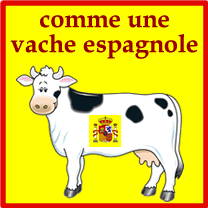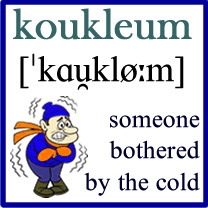
Here’s a recording in a mystery language.
Do you know or can you guess the language, and do you know where it’s spoken?

Here’s a recording in a mystery language.
Do you know or can you guess the language, and do you know where it’s spoken?
If you are in the eye of the storm you are in the center or most intense part of a tumultuous situation, or literally in the calm region at the centre of a storm, hurricane, cyclone or typhoon [source].
In French equivalents of the eye of the storm include l’oeil du cyclone (the eye of the cyclone), l’œil de la tempête (the eye of the storm) and le cœur de la tempête (the heart of the storm) [source].
The French word tempête (storm, tempest), and the English word tempest both come from the Old French tempeste (storm, tempest), from the Latin tempesta (storm, tempest), from tempestās (storm, tempest, weather, season) from tempus (time, weather), from the Proto-Indo-European *tempos (stretch) [source].
The French word temps (time, weather), comes from the same root, as does the Spanish word tiempo (time, weather), Italian word tempo (time, weather) and related words in other languages.
The expression a tempest in a teapot, meaning ‘a small event that has been exaggerated out of proportion’, dates from 1818, and is apparently the American English equivalent of the British English storm in a teacup. Before then the equivalent was a storm in a creambowl, which dates from the 1670s [source]. Other versions of this phrase include a tempest/storm in a glass of water and a storm in a wash-hand basin [source].
In French you could talk about une tempête dans un verre d’eau (a storm in a glass of water)
The Dutch word dier [diːr / diər] means animal and is cognate with the English word deer, which originally meant animal, but the meaning narrowed over time. They are also cognate with words for animal in other Germanic languages, such as Tier in German, dyr in Danish and Norwegian, dýr in Faroese and Icelandic, and djur in Swedish [source].
Dier comes from the Middle Dutch dier (animal), from the Old Dutch dier (animal), from the Proto-West Germanic *deuʀ ((wild) animal, beast), from the Proto-Germanic *deuzą ((wild) animal, beast), from the Proto-Indo-European *dʰewsóm [source], from *dʰews- (to breathe, breath, spirit, soul, creature) [source].
Some related words include:
Deer comes from the same root, via the Middle English deere, dere, der, dier, deor (small animal, deer), from the Old English dēor (animal) [source].
From the PIE root *dʰews- we also get the Russian word душа [dʊˈʂa] (soul, spirit, darling), via the Old East Slavic доуша (duša – soul), and the Proto-Slavic *duša (soul, spirit), and related words in other slavic languages.
Another Dutch word for animal is beest [beːst] which is cognate with the English word beast. Both come from the same PIE root as dier/deer (*dʰews-): beest via the Middle Dutch beeste (animal), from the Old French beste (beast, animal), from the Latin bēstia (beast) [source], and beast via the Middle English beeste, beste (animal, creature, beast, merciless person) [source].
Some related words include:
The English word animal is also related to souls and spirits as it comes via Middle English and Old French, from the Latin anima (soul, spirit, life, air, breeze, breath) [source].
The Dutch word for deer is hert [ɦɛrt], which comes from the Old Dutch hirot, from the Proto-Germanic *herutaz (deer, stag), from the Proto-Indo-European *ḱerh₂- (horn). The English word hart comes from the same root via the Old English heorot (stag), and means a male deer, especially a male red deer after his fifth year [source].
Here’s an audio version of this post.

Here’s a recording in a mystery language.
Do you know or can you guess the language, and do you know where it’s spoken?

In French if you don’t speak a langauge very well, you are said to speak it “like a Spanish cow”, or “comme une vache espagnole” [source]. For example:
This expression was first used in writing in the 17th century, and possibly referred to vasces, that is Gascons or Basques, rather than vaches, or cows. At the time, Basque people from Spain probably didn’t speak French very well. Or it might come from basse (servant, maid), or from the use of comme une vache as an insult. Also, calling people and things espagnole (Spanish) was also an insult at the time [source].
In English you might say that someone speaks broken English or bad English, or that they butcher or murder English. Although, as the American author H. Jackson Brown Jr. says “Never make fun of someone who speaks broken English. It means they know another language” [source].
You could make up other ways to say you speak a language badly:
Are there idioms in other languages to refer to people speaking them badly, or indeed well?
Here’s an audio version of this post.

Over the past year, and before, we’ve often been told that we’re all “in the same boat”, at least in the UK. The intention is to suggest that we are all in a similar situation or predicament, and the expression is often used by those in positions of power, wealth and privilege.
The idea of being in the same boat meaning ‘having the same fate’ first appeared in writing in 1584 in Thomas Hudson’s translation of Du Bartas’ Historie of Judith:
haue ye paine ? so likewise paine haue we :
For in one bote we both imbarked be.
Vpon one tide, one tempest doeth vs tosse,
Your common ill, it is our common losse.
It appeared more or less in the current form in writing by Thomas Taylor, a British cleryman in 1629. He said:
He is in the same boate which is tossed and threatned with the tempest, and is someway interessed in the common cause, and quarrell.
Source: phrases.org.uk
Equivalents of this phrase in French include:
Source: Reverso.net
Which of these, if any, is most commonly used?
In other languages, such as Dutch, German, Italian, Spanish, Russian and Japanese, you can talk about being in the same boat. Are there any languages in which this idea is referred to without mentioning boats?

Here’s a recording in a mystery language.
Do you know or can you guess the language, and do you know where it’s spoken?
Today I came to undestand that the Dutch words begrijpen and verstaan both mean to understand, however they’re used in different contexts and have somewhat different meanings.
Begrijpen [bəˈɣrɛi̯pə(n)] means to understand concepts, ideas etc. or to get (a rise out of sb). It comes from the prefix be- and grijpen (to grab) [source].
Some related words include:
Verstaan [vərˈstaːn] means (1) to understand (language, words), to hear clearly, or (2) to understand (an idea): the first meanings are more common, and begrijpen is generally used when talking about understanding ideas.
It comes from the Middle Dutch verstaen (to be responsible for, to understand, to hear, to listen, to pay attention, to notice), from the Old Dutch farstān (to understand), from the Proto-Germanic *fura (in front of, against) and *stāną (to stand) [source].
Some related words include:
Another word meaning to understand is snappen, which also means to get or catch.
Do other languages make a similar distinction between understanding ideas and understanding languages and words?
There are various words in English for understanding:

Here’s a recording in a mystery language.
Do you know or can you guess the language, and do you know where it’s spoken?

Are you a shivery type? Or maybe a heat freak? Or in other words, do you prefer warmer temperatures, and turn up the heating when it gets cold?
If so, then you could call yourself a koukleum [ˈkɑu̯kløːm], a Dutch word meaning a “person who is often/easily cold, person bothered by the cold a lot” [source], or a ‘shivery type’ [source]. It comes from kou (a low temperature situation) and kleumen (to be stiff with cold) [source].
Related words include:
The German word Frostbeule has a similar meaning to koukleum, and also means frostbite or chilblain [source].
A koukleum might suffer from cryophobia (an abnormal fear of ice or frost; a morbid fear of freezing) [source], and might be a cryophobic, which is the nearest English word I can find.
The opposite of cryophobic is cryophilic, which usually refers to plants or animals and means “having an affinity for or thriving at low temperatures; able to thrive at low temperatures” [source].
According to this article, about 20% of people have a genetic mutation which makes them better able to resist cold temperatures and to live in cold climates.
I’m not a koukleum, and in fact prefer cooler temperatures. I haven’t found a word for this preference in Dutch, English or other languages. How about you?